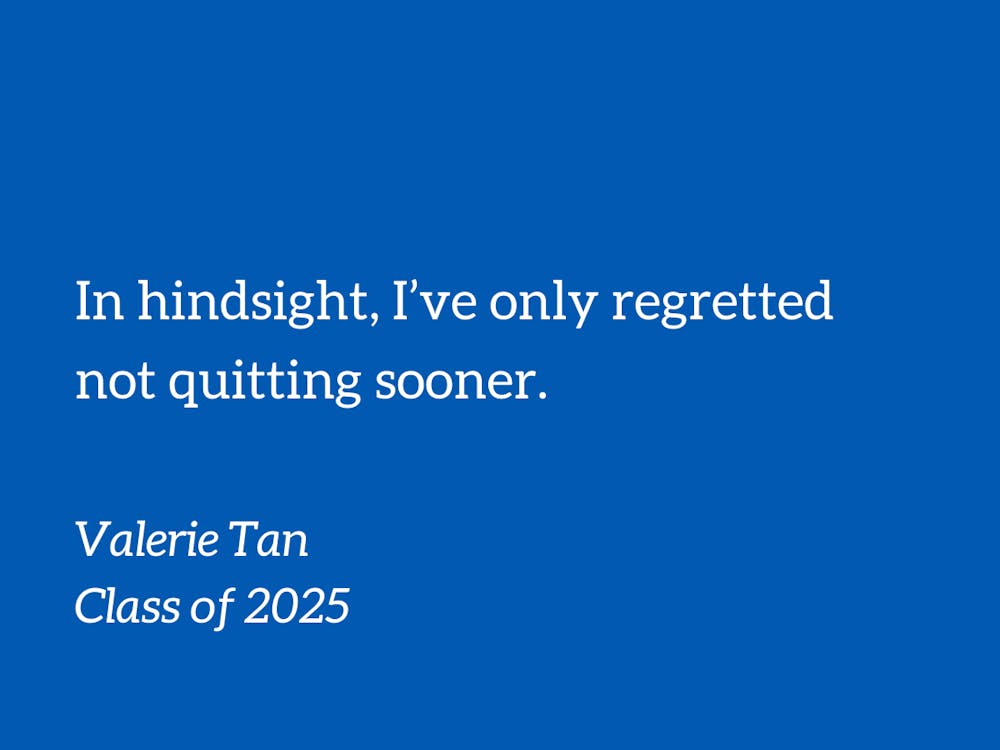Giving up is not in the vocabulary of most Duke students. We complain about having too much on our plates and bemoan the lack of personal time to do the things we truly enjoy, but adamantly keep one foot in every door. We cling tenaciously to commitments that our freshmen selves took on impulsively, no matter how much we’ve come to dread them. Many of us end up shackled to these responsibilities till graduation, having missed the window of opportunity to call it quits.
Why do we struggle so much with quitting? Was college not designed to be a sandbox where we can explore our professional aspirations and personal interests without any strings attached? As college students empowered by newfound autonomy yet still free from adult responsibilities, should we not be savoring this golden period of self-discovery?
The thing is, expectations — from ourselves and others — have a way of keeping us fettered to our initial trajectories.
Some of us marched into college with ambitious goals and detailed four-year action plans, only to realize that they do not align with our interests. But even with the freedom to switch paths at our fingertips, we hesitate to exercise it, repulsed by the thought of putting all the time and effort we’ve already invested to waste. After all, without any guarantee that the alternative would be any better, we risk making the wrong call and begetting a lifetime of regret.
Some of us feel obligated to let our personal enjoyment take a backseat to practical motivations. We persist in academic or professional pursuits that don’t necessarily bring us joy, all in the name of bolstering our portfolio game. Presented with a plethora of opportunities but a scarcity of time, we feel pressured to participate in as many activities as possible to maximize our experiences, even if it means spreading ourselves thin to the point of burnout.
The fear of failure is, of course, another major deterrent. At a private college like Duke, where everyone seems to have mastered their own delicate balancing acts, giving up feels akin to admitting defeat. As much as we might casually flirt with the idea of quitting or boldly declare our intentions to throw in the towel, few actually summon the courage to act on that resolve. It is a mark of dishonor for us overachievers, a blemish on our immaculate records that will haunt us for the rest of our lives.
It does not help that most of us were accepted to Duke for specific niches that we’ve spent a lifetime carving out, be it athletic prowess, artistic talent or academic flair. These skills have become so integral to our identities that losing them would be tantamount to losing a part of ourselves. Thus, gritting our teeth through the dreary repetition, we devote hours of practice to honing and maintaining them at the expense of time for other pursuits.
As a perfectionist, I too struggle with quitting. Mustering the courage to call it quits is difficult enough, but finding the right timing is even more so. Whenever I feel the urge to give up arise within me, I entertain it briefly before brushing it off as temporary disillusionment and reassuring myself that things will get better as long as I persevere long enough. But how long is long enough?
After two years of college, I’ve learned that giving up is a skill that comes with a lot of practice and experience. But I’ve also learned to trust my instincts more. There might have been instances when I quit prematurely, failing to hold out long enough to experience personal growth or witness improvements in the circumstances. But more often than not, once the situation regressed to the point where the thought of giving up even occurred to me, quitting turned out to be the right choice. In hindsight, I’ve only regretted not quitting sooner. Living in adamant denial and with baseless optimism kept me unhappily bound to a few too many commitments that I should have abandoned a long time ago.
As we go through our annual routine of piling our plates with extracurricular and academic involvements, let us not be bogged down with the weight of previous affiliations and hefty expectations or disheartened by the fear of humiliation and uncertainty. Four years are too short to be spent suffering through experiences that are seemingly beneficial or obligatory, at the expense of those that truly delight us.
Valerie Tan is a Pratt junior. Her column typically runs on alternate Wednesdays.
Get The Chronicle straight to your inbox
Sign up for our weekly newsletter. Cancel at any time.
Valerie Tan is a Pratt junior and an opinion managing editor of The Chronicle's 119th volume.

